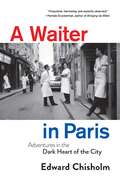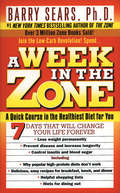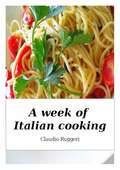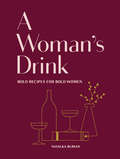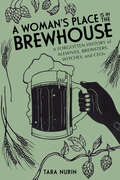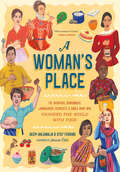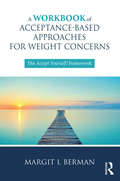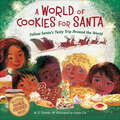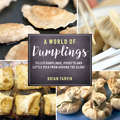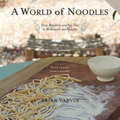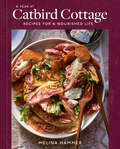- Table View
- List View
A Waiter in Paris: Adventures in the Dark Heart of the City
by Edward ChisholmInspired by George Orwell’s Down and Out in Paris and London, A Waiter in Paris is a brilliant portrait of the underbelly of contemporary Paris through the eyes of a young waiter scraping out a living in the City of Light. A waiter’s job is to deceive you. They want you to believe in a luxurious calm because on the other side of that door … is hell. Edward Chisholm’s spellbinding memoir of his time as a Parisian waiter takes you below the surface of one of the most iconic cities in the world and right into its glorious underbelly. There, Chisholm inhabits a world of inhuman hours, snatched sleep, and dive bars. He scrapes by on coffee, bread, and cigarettes, often working under sadistic managers, for a wage so low he’s forced to fight his colleagues for tips. And these colleagues — thieves, narcissists, ex-Legionnaires, paperless immigrants, wannabe actors, and drug dealers — are the closest thing he has to family. Waiting tables is physically demanding work, frequently humiliating, and incredibly competitive. But it doesn’t matter because you’re in Paris, the centre of the universe, and there’s nowhere else you’d rather be in the world.
A Waiter in Paris: Adventures in the Dark Heart of the City
by Edward ChisholmAn evocative portrait of the underbelly of contemporary Paris as seen through the eyes of a young waiter scraping out a living in the City of Light. A waiter's job is to deceive you. They want you to believe in a luxurious calm because on the other side of that door . . . is hell. Edward Chisholm's spellbinding memoir of his time as a Parisian waiter takes you beneath the surface of one of the most iconic cities in the world—and right into its glorious underbelly. He inhabits a world of inhuman hours, snatched sleep and dive bars; scraping by on coffee, bread and cigarettes, often under sadistic managers, with a wage so low you're fighting your colleagues for tips. Your colleagues—including thieves, narcissists, ex-soldiers, immigrants, wannabe actors, and drug dealers—are the closest thing to family that you've got. It's physically demanding, frequently humiliating and incredibly competitive. But it doesn't matter because you're in Paris, the center of the universe, and there's nowhere else you'd rather be in the world.
A Waiter in Paris: Adventures in the Dark Heart of the City
by Edward ChisholmA waiter's job is to deceive you. They want you to believe in a luxurious calm because on the other side of that door...is hell.Edward Chisholm's spellbinding memoir of his time as a Parisian waiter takes you below the surface of one of the most iconic cities in the world and right into its glorious underbelly.He inhabits a world of inhuman hours, snatched sleep and dive bars; scraping by on coffee, bread and cigarettes, often under sadistic managers, with a wage so low you're fighting your colleagues for tips. Colleagues - including thieves, narcissists, ex-Legionnaires, paperless immigrants, wannabe actors and drug dealers - who are the closest thing to family that you've got.It's physically demanding, frequently humiliating and incredibly competitive. But it doesn't matter because you're in Paris, the centre of the universe, and there's nowhere else you'd rather be in the world.(p) 2022 Octopus Publishing Group.
A Week in the Zone
by Barry Sears Deborah KotzA national bestseller for more than three years in hardcover, The Zone has introduced millions of people worldwide to a breakthrough approach to dieting based on Novel Prize-winning scientific research. Treating food as the most powerful drug available, The Zone plan shows how food, when used unwisely, can be toxic. Used wisely however, it will take anyone into the Zone, a state of exceptional health familiar to champion athletes. Now the benefits of Barry Sears?evolutionary program can be experienced in just one week! With A Week in the Zone, everyone can start on the path to permanent weight loss and learn how to burn body fat, and keep it off - without deprivation or hunger. They'llalso discover how the Zone helps to both increase energy and fight heart disease, diabetes, PMS, chronic fatigue, depression, and cancer.
A Week in the Zone
by Barry Sears Deborah KotzA national bestseller for more than three years in hardcover, The Zone has introduced millions of people worldwide to a breakthrough approach to dieting based on Novel Prize-winning scientific research. Treating food as the most powerful drug available, The Zone plan shows how food, when used unwisely, can be toxic. Used wisely however, it will take anyone into the Zone, a state of exceptional health familiar to champion athletes. Now the benefits of Barry Sears?evolutionary program can be experienced in just one week! With A Week in the Zone, everyone can start on the path to permanent weight loss and learn how to burn body fat, and keep it off - without deprivation or hunger. They'llalso discover how the Zone helps to both increase energy and fight heart disease, diabetes, PMS, chronic fatigue, depression, and cancer.
A Week of Italian Cooking
by Claudio Ruggeri Ludovica CassanoI decided to write this cookbook after I have noted, for a week, what I ate, all the food that my mother prepared and cooked for me and my sister. I hope to be able to give some advice to all these people who, they've been hearing of Italian cooking, they were curious to know what Italians usually eat everyday.
A Wine Expert's Guide to the Best Booze-Free Drinks
by Helen McGinnEver decided to go booze-free only to find the alternatives a little, well . . . boring? If you're embarking on a dry spell, this book is just the tonic (so to speak).Drinks expert Helen McGinn shows you how to make the most of your time off the sauce with plenty of recipes for simple homemade mocktails, infusions and cordials, along with a guide to non-alcoholic wines, beers and spirits worth adding to your drinks cupboard.Think of this book as a friend, with a (dry) sense of humour, to keep you company in style through your booze-free spell.
A Wine Journey along the Russian River
by Steve HeimoffSteve Heimoff takes readers on an intimate and enlightening tour of one of California's most diverse and accomplished wine areas as he travels along the Russian River and talks with growers and vintners from the Cabernet country of the Alexander Valley to the Pinot Noir producers of the Sonoma coast. This first comprehensive look at the natural history and winemaking practices of the region by one of America's most respected wine critics brings the Russian into the exalted company of the great wine rivers of the world--the Loire, the Rhône, the Rhine, the Mosel, and the Douro. Part wine guidebook, part history and geology, and part travelogue of the author's adventures in wine country, A Wine Journey along the Russian River is essential reading for wine lovers--both those fortunate enough to be familiar with the region and those who have never been there. Heimoff guides readers along the length of the scenic river, from its warm, northern border with Mendocino out to foggy Jenner. He discusses the history and progress of Alexander Valley Zinfandel and Cabernet Sauvignon, Russian River Valley and Sonoma coast Pinot Noir, Sonoma County's Rhône-oriented wines, old-style field blends, and other interesting wines. In the process, he introduces readers to many of the growers and vintners who have made Sonoma County famous: Dick Arrowood, the Rochiolis, the Seghesios, Tom Jordon, Bob Cabral of Williams Selyem, Jess Jackson of Kendall-Jackson, Merry Edwards, and many others. Describing how the river's formation and evolution, both products of the planet's fiery tectonic past, as well as the region's complex climate, have created the potential for unparalleled viticultural enclaves, and recounting how a variety of people realized that potential, Heimoff provides a fascinating explanation of why the Russian River's reputation as a premium winegrowing region continues to grow.
A Woman's Drink: Bold Recipes for Bold Women
by Natalka Burian&“A delicately illustrated, beautifully photographed, and actually useful handbook of cocktail ideas tailored to specific scenarios.&” —Vogue Filled with gorgeous cocktails and favorite drinks from notable women, this chic package celebrates a new cocktail culture that&’s distinctly and unapologetically feminine. Inspired by Brooklyn bars Elsa and Ramona, the cocktails here capture the joys and pleasures of making the perfect drink at home. Whether you&’re drinking solo, drinking with a plus one, or drinking with a crowd, there&’s a recipe for every occasion. Featuring fifty mixed drinks—including classics like Cosmos and Negronis, as well as new spins like Elderflower Bellinis—the cocktails in this book are strong, spirited, and bold, just like the women who drink them.
A Woman's Heart: Why female heart health really matters
by Angela MaasDID YOU KNOW... ...women are 50% more likely to be misdiagnosed following a heart attack? ...more than twice as many women die from coronary heart disease than from breast cancer in the UK? ...two-thirds of clinical research into heart disease focuses on men?Coronary heart disease remains the single biggest killer of women worldwide, yet it is still not seen as a woman's problem. Every day the female heart patient is measured by male standards, which leads to confusion, unclear diagnosis and often the wrong treatment.In fact, women are incomparable to men down to each body cell, which has consequences for both health and disease. When it comes to medical science, cardiology is the most prominent example in which gender matters.In A Woman's Heart, Professor Maas explores how the female heart works and provides practical advice for women, including: - The biology of the female heart - how it works and ages differently to a male's - The effects of female-specific issues, such as menopause - Heart attacks in women- Lifestyle tips to prevent heart diseaseThis vital book is the result of decades of international research. It exposes the gender bias in cardiology and paves the way for better heart health for women everywhere.
A Woman's Heart: Why female heart health really matters
by Professor Angela MaasDID YOU KNOW... ...women are 50% more likely to be misdiagnosed following a heart attack? ...more than twice as many women die from coronary heart disease than from breast cancer in the UK? ...two-thirds of clinical research into heart disease focuses on men?Coronary heart disease remains the single biggest killer of women worldwide, yet it is still not seen as a woman's problem. Every day the female heart patient is measured by male standards, which leads to confusion, unclear diagnosis and often the wrong treatment.In fact, women are incomparable to men down to each body cell, which has consequences for both health and disease. When it comes to medical science, cardiology is the most prominent example in which gender matters.In A Woman's Heart, Professor Maas explores how the female heart works and provides practical advice for women, including: - The biology of the female heart - how it works and ages differently to a male's - The effects of female-specific issues, such as menopause - Heart attacks in women- Lifestyle tips to prevent heart diseaseThis vital book is the result of decades of international research. It exposes the gender bias in cardiology and paves the way for better heart health for women everywhere.
A Woman's Heart: Why female heart health really matters
by Professor Angela MaasDID YOU KNOW... ...women are 50% more likely to be misdiagnosed following a heart attack? ...more than twice as many women die from coronary heart disease than from breast cancer in the UK? ...two-thirds of clinical research into heart disease focuses on men?Coronary heart disease remains the single biggest killer of women worldwide, yet it is still not seen as a woman's problem. Every day the female heart patient is measured by male standards, which leads to confusion, unclear diagnosis and often the wrong treatment.In fact, women are incomparable to men down to each body cell, which has consequences for both health and disease. When it comes to medical science, cardiology is the most prominent example in which gender matters.In A Woman's Heart, Professor Maas explores how the female heart works and provides practical advice for women, including: - The biology of the female heart - how it works and ages differently to a male's - The effects of female-specific issues, such as menopause - Heart attacks in women- Lifestyle tips to prevent heart diseaseThis vital book is the result of decades of international research. It exposes the gender bias in cardiology and paves the way for better heart health for women everywhere.(p) 2020 Octopus Publishing Group
A Woman's Place Is in the Brewhouse: A Forgotten History of Alewives, Brewsters, Witches, and CEOs
by Tara Nurin Teri FahrendorfDismiss the stereotype of the bearded brewer. It's women, not men, who've brewed beer throughout most of human history. Their role as family and village brewer lasted for hundreds of thousands of years—through the earliest days of Mesopotamian civilization, the reign of Cleopatra, the witch trials of Medieval and Renaissance Europe, and the settling of colonial America. A Woman's Place Is in the Brewhouse celebrates the contributions and influence of female brewers and explores the forces that have erased them from the brewing world. It's a history that's simultaneously inspiring and demeaning. Wherever and whenever the cottage brewing industry has grown profitable, politics, religion, and capitalism have grown greedy. On a macro scale, men have repeatedly seized control and forced women out of the business. Other times, women have simply lost the minimal independence, respect, and economic power brewing brought them. But there are more breweries now than at any time in American history and today women serve as founder, CEO, or head brewer at more than one thousand of them.As women continue to work hard for equal treatment and recognition in the industry, author Tara Nurin shows readers that women have been—and are once again becoming—relevant in the brewing world.
A Woman's Place is in the Kitchen: 'Fantastic, exciting deep dive into kitchen life from one of Britain's leading young chefs' (Tom Kerridge)
by Sally Abé'Sally really tells it how it is . . . This book will be a go to for those needing that bit of bravery and resilience in a world that needs more people like her' CANDICE BROWN'Wow. Sally's book is an insightful, honest account of a young cook's journey to an inspirational chef' ANGELA HARTNETT'She doesn't so much pull back the curtains as yank them away, revealing the plain truth of what it takes to get dinner on to your plate' OBSERVERThis is the story of Sally Abé's rise to become an award-winning chef in the brutal world of restaurant kitchens; how a girl from the midlands who used to cook herself Smash to get by is now one of the most successful fine-dining chefs working today.It's a familiar trope: angry men berating each other in kitchens as pots furiously boil, sauces burn and a giant slab of beef rests in the background. The dominant view of a professional kitchen is one of chaos and pent-up fury - a gladiatorial contest of male ego. Why then do we also hear the misogynistic refrain that women 'belong in the kitchen' if, in a professional context, they're all but erased from them? A Woman's Place is in the Kitchen is a stirring manifesto - drawing back the curtain on restaurant kitchens to show how she is endeavouring to change them for the better. Filled with stories of Michelin-starred food, the relentlessness of kitchens, as well as the hope for the future of the culinary landscape, Sally's memoir is set to become a classic.
A Woman's Place is in the Kitchen: dispatches from behind the pass
by Sally Abé'Fantastic, exciting deep dive into kitchen life from one of Britain's leading young chefs' TOM KERRIDGE'Sally really tells it how it is . . . This book will be a go to for those needing that bit of bravery and resilience in a world that needs more people like her' CANDICE BROWN'Wow. Sally's book is an insightful, honest account of a young cook's journey to an inspirational chef' ANGELA HARTNETTFrom the star of the Great British Menu, for readers who loved Kitchen Confidential and couldn't tear their eyes away from Boiling Point, a book that reveals the reality of working in restaurant kitchens - and how they need to change for the betterIt's a familiar trope: angry men berating each other in kitchens as pots furiously boil, sauces burn and a giant slab of beef rests in the background. The dominant view of a professional kitchen is one of chaos and pent-up fury - a gladiatorial contest of male ego. Why then do we also hear the misogynistic refrain that women 'belong in the kitchen' if, in a professional context, they're all but erased from them? A Woman's Place is in the Kitchen is the story of Sally Abé's rise to become an award-winning chef in the brutal world of restaurant kitchens; how a girl from the midlands who used to cook herself Smash to get by is now one of the most successful fine-dining chefs working today. More than that, Sally's story is also a stirring manifesto - drawing back the curtain on restaurant kitchens to show how she is endeavouring to change them for the better. Filled with stories of Michelin-starred food, the relentlessness of kitchens, as well as the hope for the future of the culinary landscape, Sally's memoir is set to become a classic.
A Woman's Place is in the Kitchen: dispatches from behind the pass
by Sally Abé'Fantastic, exciting deep dive into kitchen life from one of Britain's leading young chefs' TOM KERRIDGE'Sally really tells it how it is . . . This book will be a go to for those needing that bit of bravery and resilience in a world that needs more people like her' CANDICE BROWN'Wow. Sally's book is an insightful, honest account of a young cook's journey to an inspirational chef' ANGELA HARTNETTFrom the star of the Great British Menu, for readers who loved Kitchen Confidential and couldn't tear their eyes away from Boiling Point, a book that reveals the reality of working in restaurant kitchens - and how they need to change for the betterIt's a familiar trope: angry men berating each other in kitchens as pots furiously boil, sauces burn and a giant slab of beef rests in the background. The dominant view of a professional kitchen is one of chaos and pent-up fury - a gladiatorial contest of male ego. Why then do we also hear the misogynistic refrain that women 'belong in the kitchen' if, in a professional context, they're all but erased from them? A Woman's Place is in the Kitchen is the story of Sally Abé's rise to become an award-winning chef in the brutal world of restaurant kitchens; how a girl from the midlands who used to cook herself Smash to get by is now one of the most successful fine-dining chefs working today. More than that, Sally's story is also a stirring manifesto - drawing back the curtain on restaurant kitchens to show how she is endeavouring to change them for the better. Filled with stories of Michelin-starred food, the relentlessness of kitchens, as well as the hope for the future of the culinary landscape, Sally's memoir is set to become a classic.
A Woman's Place: The Inventors, Rumrunners, Lawbreakers, Scientists, and Single Moms Who Changed the World with Food
by Stef Ferrari Deepi Ahluwalia Jessica Olah<p>Discover the trailblazing women who changed the world from their kitchens. <p>If "a woman's place is in the kitchen," why is the history of food such an old boys' club? <p>A Woman's Place sets the record straight, sharing stories of more than 80 hidden figures of food who made a lasting mark on history. <p>In an era when women were told to stay at home and leave glory to the men, these rebel women used the transformative power of food to break barriers and fight for a better world. Discover the stories of: <p> <li>Georgia Gilmore, who fueled the Montgomery Bus Boycott with chicken sandwiches and slices of pie <li>Hattie Burr, who financed the fight for female suffrage by publishing cookbooks <li>Kamaladevi Chattopadhyay, who, with just a few grains of salt, inspired a march for the independence of India <li>The inventors of the dishwasher, coffee filter, the first buffalo wings, Veuve Clicquot champagne, the PB&J sandwich, and more.</li> <p> <p>With gorgeous full-color illustrations and 10 recipes that bring the story off of the page and onto your plate, this book reclaims women's rightful place--in the kitchen, and beyond.</p>
A Workbook of Acceptance-Based Approaches for Weight Concerns: The Accept Yourself! Framework
by Margit BermanThis three-part workbook offers a concise and forgiving research- based guide to clients’ diffi culties with sustained weight loss. Part 1 is a review of your client’s previous efforts at weight control and image change, as well as information and a review of research to help your client understand why weight loss might not have worked in the past. Part 2 contains information and exercises to help your client develop a new acceptance of their body and their relationship with food, as well as tools to develop mindfulness and self- compassion. Part 3 will help your client identify, experiment with, and commit to values related to food, appearance, and other important areas of life, tackling troublesome mental and practical barriers along the way.
A World of Cake: 150 Recipes for Sweet Traditions from Cultures Near and Far; Honey cakes to flat cakes, fritters to chiffons, tartes to tortes, meringues to mooncakes, fruit cakes to spice cakes
by Krystina CastellaTake your sweet tooth on a global tour! Whether you’re indulging in Australian pavlova, Japanese mochi, or Italian panettone, it’s just not a celebration without cake. In this delectable cookbook, Krystina Castella offers more than 150 irresistible cake recipes from around the world, accompanied by mouthwatering photographs and insights into unique cultural traditions. Discover exciting new flavors and innovative twists on your favorite desserts as you explore the sweet delights of a variety of chiffons, fruitcakes, meringues, and more.
A World of Cookies for Santa: Follow Santa's Tasty Trip Around the World
by M.E. FurmanThis beautifully illustrated book explores the traditional treats that children across the globe leave out for Santa on Christmas Eve—includes recipes!A World of Cookies for Santa takes readers on a journey to discover holiday traditions and beloved Christmas cookies from cultures around the world. Head to the Philippines, where children leave out puto seko cookies and ginger tea for Santa; jet to Russia for a honey-spice cookie; then set out for Malawi for a sweet potato cookie! And the journey continues in your own home kitchen, as author M. E. Furman provides recipes for children to bake some of Santa’s cookies for themselves. Winner of the American Book Fest Best Book Award and the Moonbeam Book Award!
A World of Dumplings: Filled Dumplings, Pockets, And Little Pies From Around The Globe
by Brian YarvinEver tried a Turkish borek? Swedish kroppkakor? How about Cajun meat pie? Acclaimed photographer Brian Yarvin has traveled to neighborhood kiosks, festivals, and restaurants in ethnic neighborhoods throughout the northeastern United States to bring more than 100 traditional dumpling and filled-pie recipes from places as near as Flushing, Queens, to as far away as Uzbekistan and beyond. Starting with the basics of dough making, steaming, and frying, Yarvin provides mouthwatering color photographs and step-by-step instructions so that anyone can recreate their grandmother's pierogi or street-food favorite at home, using ingredients from the local supermarket. Also included are tips for where to buy hard-to-find ingredients, and—if you just can't stand the wait of making your own—ethnic neighborhoods where you can find ready-to-eat dumplings.
A World of Noodles
by Brian YarvinVirtually every cuisine in every culture around the globe has something approximating a noodle. We're familiar with macaroni and cheese, spaghetti, and Asian noodle dishes, but A World of Noodles shows home cooks how much more there is to explore. Author Brian Yarvin takes us on a 100+ recipe around-the-world culinary tour, from Malaysian Assam Laksa (fish in a spicy tamarind noodle soup) and Tibetan Then Thuk (handmade noodles in broth), to Turkish Rokali Eriste (noodles with arugula, walnuts, and yogurt) and Mexican Puchero Vaquero de Zacetecas (Cowboy beef and noodle stew). Noodles are part of worldwide cuisine, from Central Europe to South America to Africa. The range of grains, flavors, and textures is dazzling. From making the dough to preparing complete dishes with delectable vegetables, meats, and spices, author Brian Yarvin will help you get delicious results, and his writing will entertain you throughout.
A Year at Catbird Cottage: Recipes for a Nourished Life [A Cookbook]
by Melina Hammer100 recipes for seasonal, locally sourced, and foraged dishes from the owner of the idyllic Catbird Cottage B&B in upstate New York. &“Melina Hammer shows us that there is beauty all around us when we cook seasonally. . . . A joyful, inspiring book for cooks, bakers, artists, and dreamers.&”—Amanda Hesser, founder and CEO, Food52ONE OF FOOD52&’S MOST ANTICIPATED COOKBOOKS OF 2022At the foot of the Shawangunk Mountain Ridge lies the hamlet of Accord, New York, dotted with orchards and farms, population 562. There, Melina Hammer welcomes guests from near and far to stay and eat at Catbird Cottage, a B&B run out of her charming home. Her eclectic table is set with meals that showcase stories and ingredients from her own garden, New York&’s wild landscape, and her travels around the globe. In her debut cookbook, Melina shares the beloved recipes from this special place, all presented seasonally just like the meals at Catbird Cottage. These recipes are organized by season, since the seasons dictate what&’s on the Catbird Cottage table. Whether it&’s Wild Salmon Gravlax, Scallop-Shiso Ceviche, Buttery Scrambled Eggs and Chanterelles, Sour Cherry Pie, or a fall-apart persimmon served with triple-cream cheese and freshly baked sourdough bread, Melina&’s food is deeply satisfying and sustaining—and emphasizes cooking and living in a more connected and joyful way. Melina also shares her foraging and preserving know-how, allowing readers to stock their pantries, cupboards, and freezers. But these recipes don&’t require you be a fully-fledged homesteader, expert forager, or connoisseur of global flavor. The book takes the foundations of these sustainable practices and integrates them into an accessible kitchen vernacular of complete nourishment. The food of Catbird Cottage is community on a plate—grown, harvested, persevered, and presented with love—and shared with cherished companions.
A Year at Hotel Gondola: The perfect heartwarming Italian romance you need to read this holiday season
by Nicky Pellegrino'Lyrical, heartrending and compelling' JOJO MOYES on Recipe for LifeKat is an adventurer, a food writer who travels the world visiting far-flung places and eating unusual things. Now she is about to embark on her biggest adventure yet - a relationship. She has fallen in love with an Italian man and is moving to live with him in Venice where she will help him run his small guesthouse, Hotel Gondola. Kat has lined up a book deal and will write about the first year of her new adventure, the food she eats, the recipes she collects, the people she meets, the man she doesn't really know all that well but is going to make a life with. But as Kat ought to know by now, the thing about adventures is that they never go exactly the way you expect them to...The perfect romantic comedy to curl up with this autumn, for fans of Jill Mansell, Katie Fforde and Jo Thomas.******Your favourite authors love Nicky Pellegrino's feel-good stories:'Warm, engaging and truly delicious' Rosanna Ley, author of The Little Theatre by the Sea'A delicious and sensual adventure' Fiona Gibson, author of The Woman Who Met Her Match'Wonderfully evocative' Pamela Hartshorne, author of The Cursed Wife
A Year at Hotel Gondola: The perfect heartwarming Italian romance you need to read this holiday season
by Nicky PellegrinoPerfect for fans of warm contemporary women's fiction from Jo Thomas and Adriana Trigiani, Nicky Pellegrino returns with a perfect summer read.Janetta has never wanted to live a small, everyday sort of life. She's an adventurer, a food writer who travels the world visiting far-flung places and eating unusual things. Now she is about to embark on her biggest adventure yet - a relationship. She has fallen in love with an Italian man and is moving to live with him in Venice where she will help him run his small guesthouse Hotel Gondola. Janetta has lined up a book deal and will write about the first year of her new adventure, the food she eats, the recipes she collects, the people she meets, the man she doesn't really know all that well but is going to make a life with. Still as Janetta ought to know by now, the whole point of adventures is they never go exactly the way you expect them to.Read by Jane McDowell(p) Orion Publishing Group 2018

